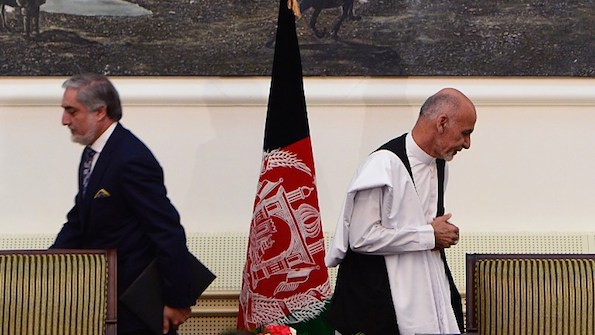Afghanistan's disputed election
Divide and rule

AFGHANISTAN has been held hostage by political stalemate for months. On September 21st it was finally broken, when the country’s two feuding presidential candidates, Ashraf Ghani and Abdullah Abdullah, signed a power-sharing agreement. Though the ceremony, at the Arg, the presidential palace in the capital Kabul, was brief and low-key, the deal will radically—and perhaps wisely—change the country’s political framework.
Neither man spoke and neither looked quite at ease. But the agreement will at least allow the new government to get on with the massive task of winning the confidence of a country that has been waiting for the deadlock to end. The four-page document, signed in the presence of outgoing President Hamid Karzai, and later by witnesses James Cunningham, the American ambassador, and Jan Kubis, the United Nations’ senior Afghanistan representative (both of whom were banned from the palace ceremony by Mr Karzai), divests the president of his vast powers.
The so-called National Unity Government intends for Mr Ghani, a Western-educated technocrat and former World Bank employee, to become president and for Dr Abdullah (or his nominee) to assume a the role of chief executive officer, newly created by decree and similar to the position of prime minister. A constitutional change, within the next two years, will confirm the role. The pair will split the allocation of senior positions, including ministries. They have also pledged to fix the country’s election system, which allows voter fraud to flourish.
The secret backroom deal, which many think usurps democratic process, was announced hours before the election commission declared Mr Ghani the winner, and Dr Abdullah the CEO. In a strange kowtowing to Dr Abdullah, who had argued that the poll was poisoned by undetectable fraud, neither the vote tallies nor the turnout were announced. The “everyone’s-a-winner” arrangement, similar to a politically-correct primary school sports day, came about after a bitterly disputed election season prompted threats to form a parallel government and fears of a return to civil war.
A former foreign minister, who came second to Mr Karzai in the election in 2009, Dr Abdullah easily won the first round of voting but without enough to avoid a run-off. In the second round, held on June 14th, Mr Ghani reversed the double-digit gap to pull off a comfortable victory, according to provisional results. Dr Abdullah alleged that he had been cheated again (after making the same charge in 2009) by “industrial scale” fraudand accused the election commission of helping rig the poll at the behest of Mr Karzai.
After the announcement of provisional results, John Kerry, the US secretary of state, travelled to Kabul. Both candidates embraced and vowed to form a government of national unity following an unprecedented audit of the vote, overseen by the UN. The audit found fraud on both sides made little change to the outcome, according to Western officials familiar with its results. That audit process started more than two months ago. In the meantime the candidates have bickered and their supporters have brawled in the audit halls.
It has been a costly few months for Afghanistan: the economy is battered and any trust in the government, widely viewed as predatory and uncaring, has evaporated. The Taliban, meanwhile, has capitalised on the dispute by launching large-scale attacks in numerous provinces. Afghan security forces are dying at a rate of about 100 a month in what has been the bloodiest summer of fighting since the war began.
All this makes the speedy signing of the bilateral security agreement between the government and America—which will allow about 14,000 foreign troops to remain past December—so vital. Mr Ghani has vowed to do what Mr Karzai refused to do and sign it within a week of his inauguration, which is likely to take place on September 29th. On paper, given the distrust between the two, the deal may look fragile and unworkable. But the pair has little choice than to make it succeed. An ethnically divided country with parallel governments is a form of mutually assured destruction, particularly given the country’s dependence on foreign money that will be impossible to source if this new government falls.
Mr Ghani, with Dr Abdullah riding shotgun, needs to demonstrate quickly that he is a partner worth funding in the long term. America can, in the short term, alleviate the country’s financial woes, harmed further through the political impasse that has emptied government coffers. It has an interest in giving the new government a chance; “They won’t spoil the ship for a ha’p’orth of tar,” says one Western official. But both Mr Ghani and Dr Abdullah owe results to their electorate, too. It has paid a steep price for this long-running squabble.
(Picture credit: AFP)
No comments:
Post a Comment